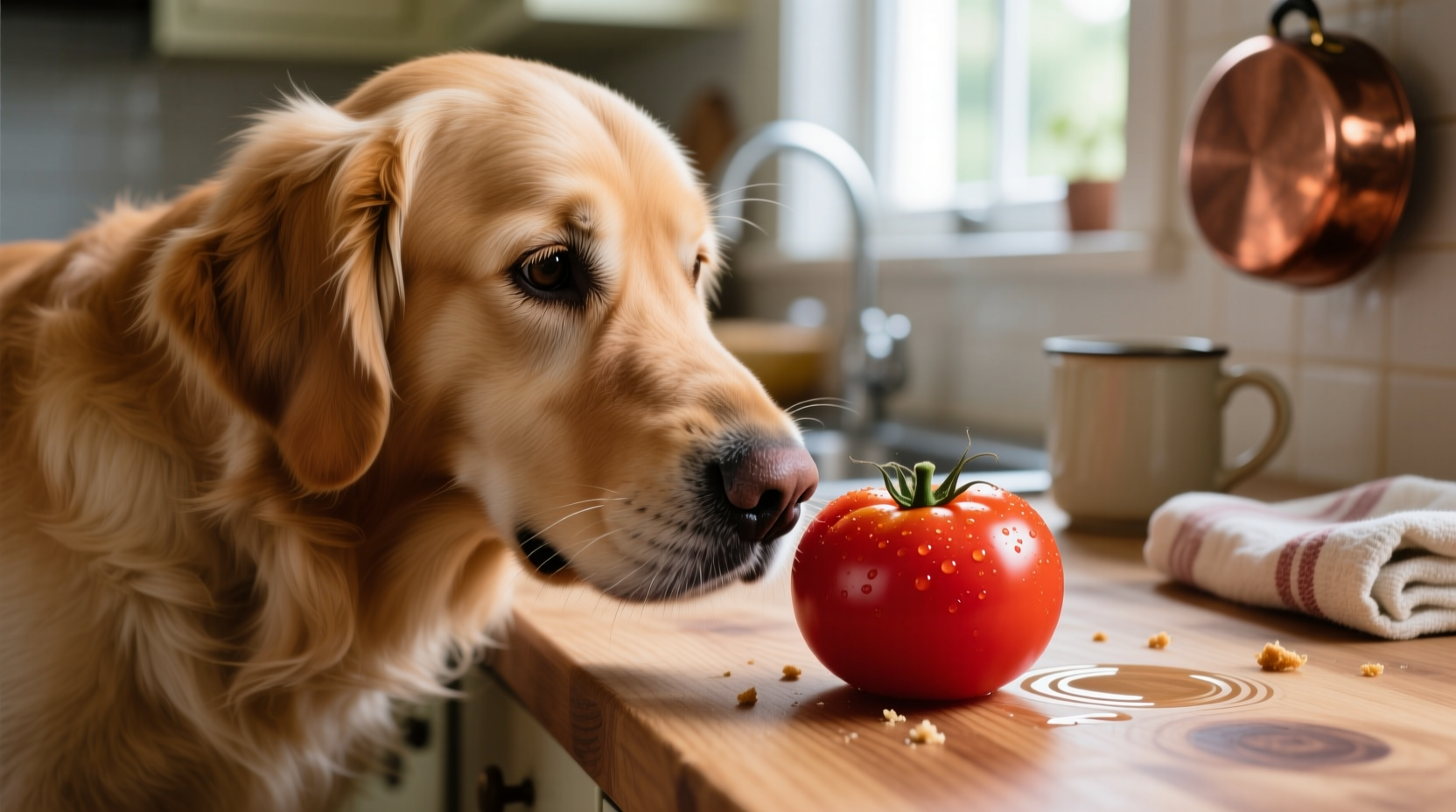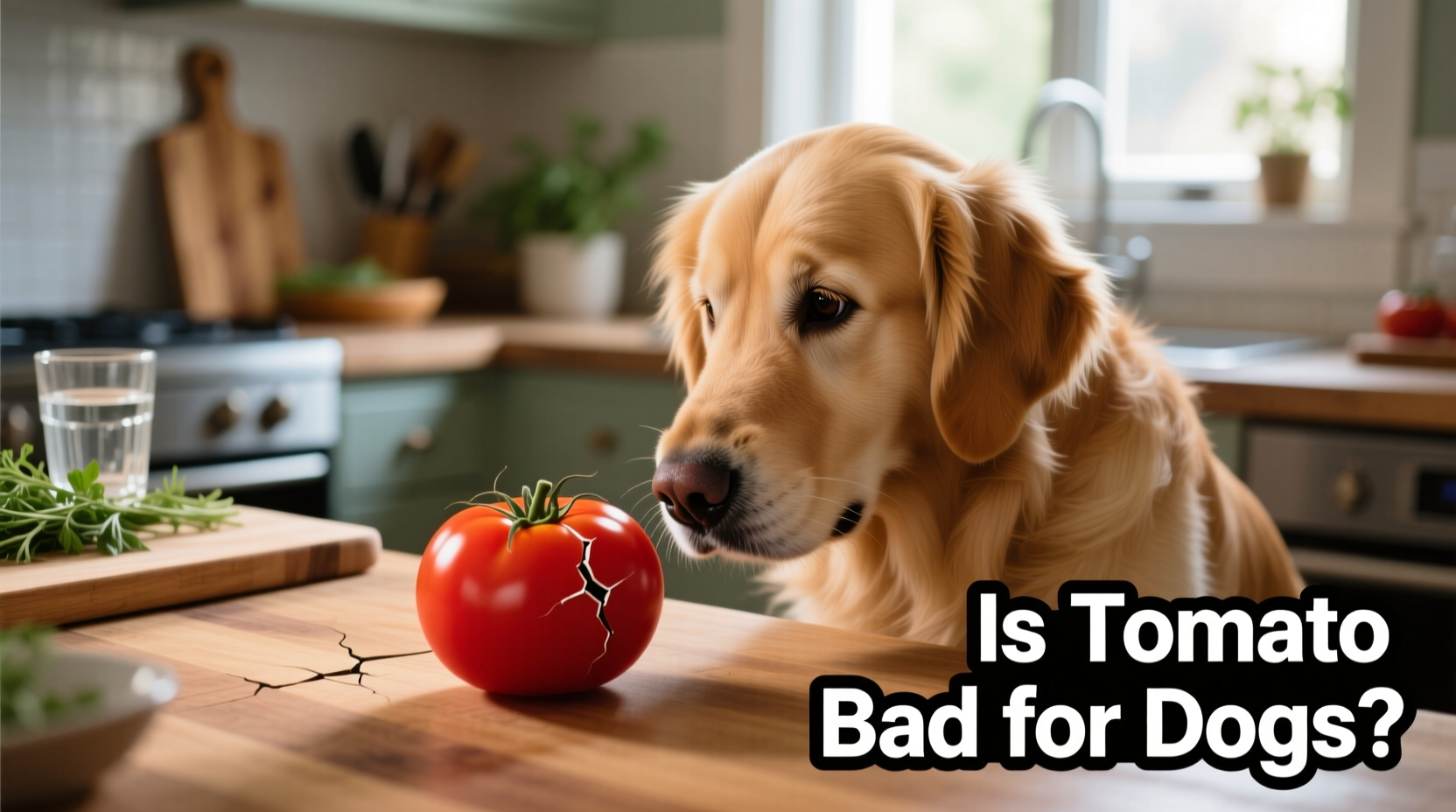Quick Answer: Ripe red tomatoes are generally safe for dogs in small amounts, but the green parts (stems, leaves, and unripe tomatoes) contain tomatine, which can be toxic. Most dogs won't experience issues from accidentally eating a small amount of ripe tomato, but large quantities or consumption of green plant parts requires veterinary attention.
Understanding Tomato Safety for Your Canine Companion
As a dog owner, you've probably wondered whether sharing a slice of tomato with your furry friend is safe. The answer isn't as simple as "yes" or "no"—it depends on which part of the tomato plant your dog consumes and how much. Let's break down the facts so you can make informed decisions about tomatoes and your dog's diet.
Tomato Components: What's Safe and What's Not
Tomatoes belong to the nightshade family (Solanaceae), which includes other common foods like potatoes and eggplants. While the ripe fruit is generally safe, certain parts contain compounds that can affect dogs differently than humans.
| Tomato Component | Safety for Dogs | Key Concerns |
|---|---|---|
| Ripe red tomatoes (flesh only) | Generally safe in moderation | High fiber content may cause mild digestive upset |
| Green tomatoes (unripe) | Potentially toxic | Higher concentration of tomatine |
| Tomato stems and leaves | Unsafe | Highest concentration of tomatine |
| Tomato plants (whole) | Unsafe | Contains solanine and tomatine |
The Science Behind Tomato Toxicity in Dogs
The primary concern with tomatoes and dogs is a compound called tomatine, which is most concentrated in the green parts of the plant. Tomatine belongs to a class of compounds called glycoalkaloids, similar to solanine found in potatoes.
According to the ASPCA Animal Poison Control Center, tomatine can cause gastrointestinal and neurological symptoms in dogs when consumed in sufficient quantities. However, the concentration decreases significantly as tomatoes ripen, making ripe red tomatoes much safer than green ones.
Research published in the Merck Veterinary Manual indicates that dogs would need to consume relatively large amounts of the toxic parts to experience serious effects. The manual notes that "the concentration of tomatine in ripe tomatoes is generally too low to cause problems in dogs."

Symptoms of Tomato Plant Poisoning in Dogs
If your dog has consumed green tomatoes, stems, or leaves, watch for these symptoms, which typically appear within 2-8 hours:
- Gastrointestinal distress (vomiting, diarrhea, loss of appetite)
- Excessive drooling
- Lethargy or weakness
- Confusion or disorientation
- Abnormal heart rate
- Muscle weakness or tremors
According to veterinary data from Veterinary Partner, severe cases are rare but can occur when dogs consume large quantities of the green plant parts. Most cases involve mild gastrointestinal symptoms that resolve with supportive care.
What to Do If Your Dog Eats Tomato Plants
Don't panic if your dog nibbles a small amount of ripe tomato—it's likely harmless. But if they've consumed green parts of the plant, follow these steps:
- Assess what was eaten: Try to determine how much and which parts were consumed
- Monitor for symptoms: Watch for the signs listed above
- Contact your veterinarian: Especially if your dog ate green tomatoes or plant parts
- Provide details: Be ready to share what was eaten, how much, and when
Your vet may recommend observation at home for minor exposures or suggest bringing your dog in for evaluation in more significant cases. In severe cases, treatment might include activated charcoal, IV fluids, or medications to manage symptoms.
Safely Sharing Tomatoes with Your Dog
If you want to share tomatoes as an occasional treat, follow these vet-approved guidelines:
- Use only ripe, red tomatoes with all green parts removed
- Wash thoroughly to remove pesticides
- Remove seeds and jelly-like substance around them
- Cut into small, manageable pieces to prevent choking
- Start with small amounts (1-2 small pieces) to assess tolerance
- Limit to no more than 1-2 tablespoons per 20 pounds of body weight
Remember that tomatoes should be considered an occasional treat, not a regular part of your dog's diet. They provide some beneficial nutrients like lycopene and vitamin C, but dogs don't require these from plant sources.
When Tomatoes Become Problematic: Context Matters
The safety of tomatoes for dogs depends on several contextual factors:
- Dog size: Smaller dogs are more susceptible to potential effects
- Amount consumed: A single ripe tomato slice is unlikely to cause issues, but multiple green tomatoes could
- Individual sensitivity: Some dogs may have digestive sensitivities
- Pre-existing conditions: Dogs with kidney issues may need to avoid tomatoes due to oxalate content
- Preparation method: Cooked tomatoes in sauces often contain harmful ingredients like garlic or onions
According to veterinary nutrition guidelines, the occasional small serving of ripe tomato represents minimal risk for most healthy dogs, but it's always best to consult your veterinarian before introducing new foods, especially if your dog has health concerns.
Common Misconceptions About Dogs and Tomatoes
Let's address some widespread myths about tomatoes and dogs:
- Myth: All tomatoes are toxic to dogs
Fact: Only the green parts contain concerning levels of tomatine - Myth: One ripe tomato will poison your dog
Fact: Dogs would need to consume large quantities of green plant parts for serious effects - Myth: Tomato-based dog foods are dangerous
Fact: Commercial dog foods use processed tomato components at safe levels
Understanding these distinctions helps prevent unnecessary worry while keeping your dog safe from genuine risks.
When to Consult Your Veterinarian
Contact your vet if your dog shows any of these signs after consuming tomato plants:
- Vomiting or diarrhea lasting more than 12 hours
- Neurological symptoms like weakness or tremors
- Refusal to eat for more than 24 hours
- Signs of dehydration (dry gums, sunken eyes, reduced skin elasticity)
For immediate concerns, the ASPCA Animal Poison Control Center is available 24/7 at (888) 426-4435 (note: consultation fee may apply).











 浙公网安备
33010002000092号
浙公网安备
33010002000092号 浙B2-20120091-4
浙B2-20120091-4